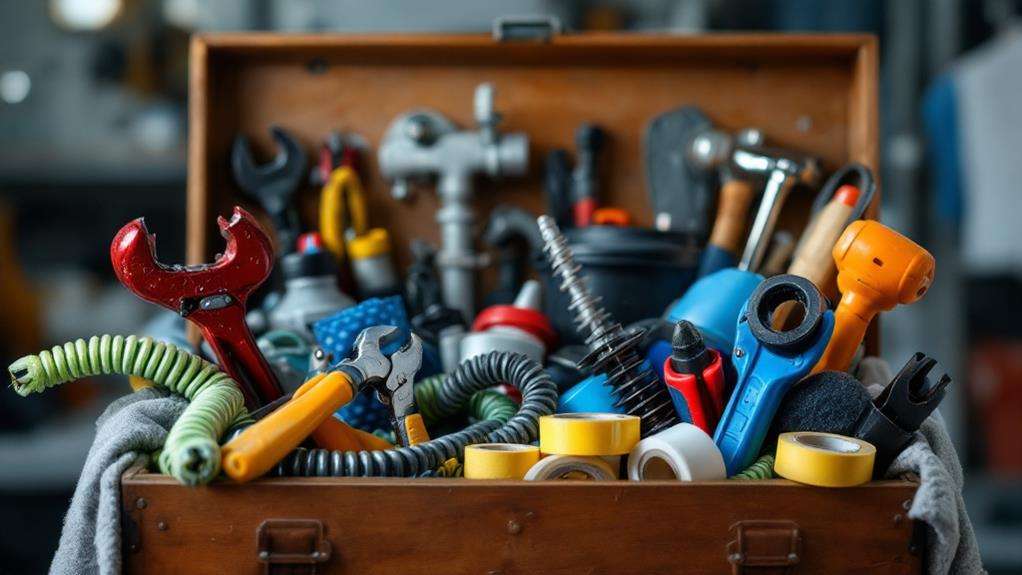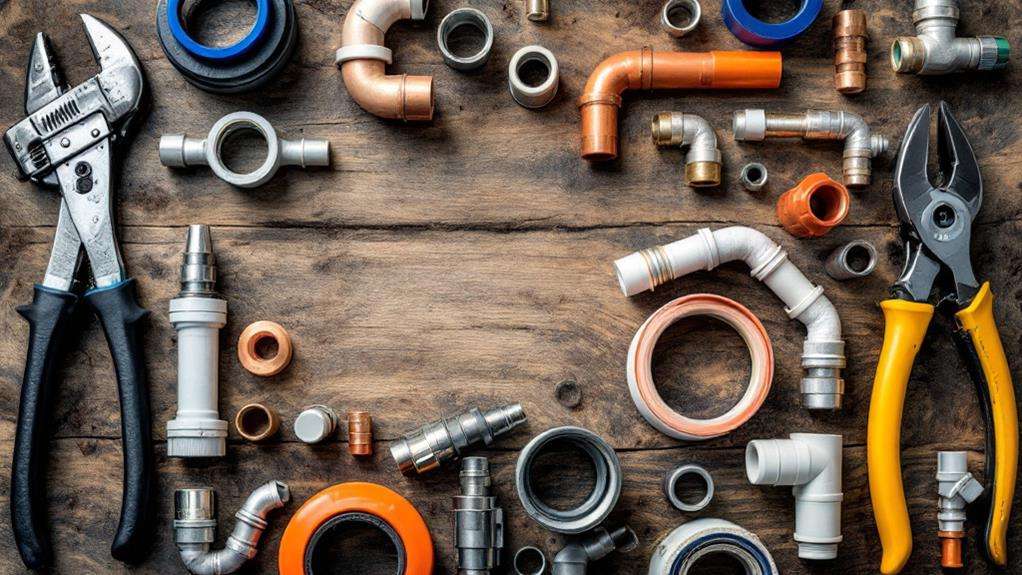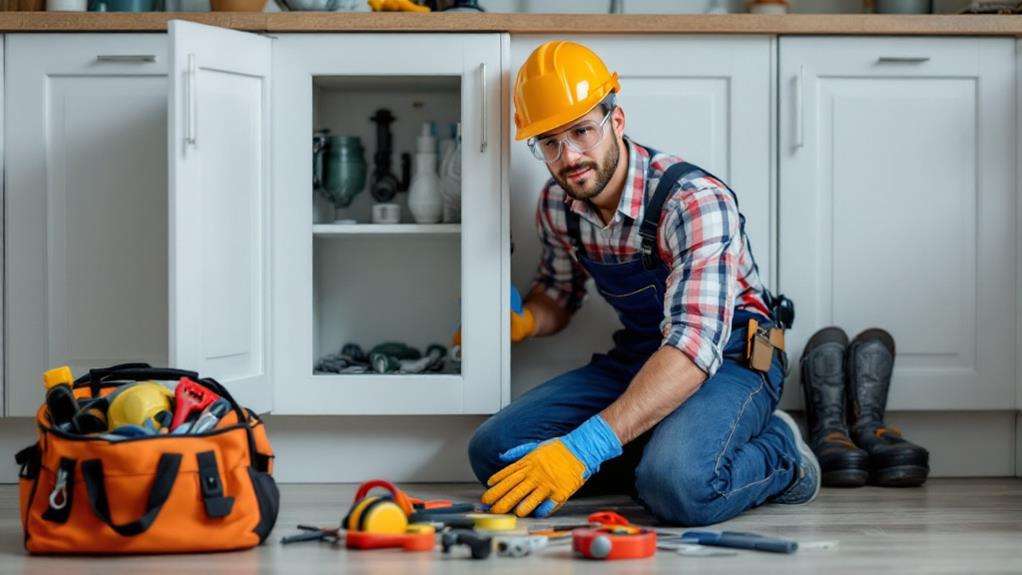Must-Have Plumbing Accessories for Every Tool Kit
Your plumbing toolkit should include essential accessories for various tasks. Start with pipe preparation tools like deburring tools and emery cloth. Don't forget specialized wrenches such as basin and adjustable pipe wrenches. For drain cleaning, you'll need a plumber's snake and plungers. Leak detection equipment like electronic detectors and moisture meters are imperative. Pipe connection essentials include pipe wrenches and tubing cutters. Always have measurement devices like tape measures and levels on hand. Ultimately, prioritize safety gear including gloves and goggles. This extensive list covers the basics, but there's more to investigate in the world of plumbing tools.
Pipe Preparation Accessories
When it comes to pipe preparation, you'll need a variety of accessories to get the job done right. Start with a deburring tool to smooth the edges of cut pipes, preventing damage and leaks in your threaded joint connections. This step is imperative before attaching nuts and bolts or using a pipe wrench to secure fittings.
Next, grab some emery cloth to remove rust, corrosion, and residues from metal pipes. This guarantees a clean surface for secure connections. Don't forget a flux brush to apply flux evenly inside pipes before soldering. It's a small but indispensable tool for creating watertight joints.
For versatility, invest in a combination tool that can cut, debur, and ream pipes all in one. This multi-functional accessory saves space in your toolkit and time on the job. When power tools aren't an option, a trusty hacksaw provides a reliable manual alternative for cutting pipes.
Specialized Plumbing Wrenches
A plumber's toolkit isn't complete without specialized wrenches designed for specific tasks. You'll need a basin wrench for those hard-to-reach areas behind sinks. Its T-shaped handle allows you to tighten or loosen mounting nuts that secure faucets. When working with pipes, an adjustable pipe wrench is essential. Its serrated jaws grip firmly, providing the force you need for threaded connections.
Don't forget about faucet seat wrenches. These uniquely shaped tools help you access and adjust internal faucet components like valve seats and springs. If you're dealing with garbage disposals, a garbage disposal wrench is a must-have. Its hexagonal shape is perfect for gripping the disposal flange during installation or removal.
Lastly, keep an adjustable wrench, also known as a crescent wrench, in your kit. This versatile tool can handle various nut and bolt sizes common in plumbing work. With its adjustable jaw, you'll be prepared for a wide range of situations. By having these specialized plumbing wrenches on hand, you'll be equipped to tackle most plumbing tasks efficiently and effectively.
Drain Cleaning Tools

For effective drain cleaning, you'll need a variety of specialized tools. These essential accessories can help you tackle stubborn clogs and maintain smooth-flowing pipes in your home. A drain auger, also known as a plumber's snake or hand auger, is a versatile tool that can reach deep into pipes to dislodge blockages. You'll want to have different types of plungers on hand, including a flange plunger for toilets and a cup plunger for sinks and bathtubs.
For more aggressive cleaning, consider these options:
- Drain cleaners: Chemical solutions that dissolve organic matter
- Pipe cleaners: Small wire brushes for manual debris removal
- Electric drain augers: Motorized snakes for tough clogs
- Hand augers: Manual tools for deeper reach
When using a drain snake or auger, extend the flexible metal coil down the drain to break up or remove the clog. Plungers work by creating suction to dislodge blockages. For minor clogs, pipe cleaners can be effective in scraping away built-up debris. Remember to use chemical drain cleaners cautiously and always follow the instructions. By keeping these essential drain cleaning tools in your plumbing kit, you'll be prepared to tackle a wide range of drain issues.
Leak Detection Equipment
Leak detection tools are essential for any homeowner or plumber's arsenal. With the right leak detection equipment, you'll be able to quickly identify and locate hidden water leaks in your plumbing systems, saving time and preventing costly damage.
One of the most versatile tools is the electronic leak detector, which uses ultrasonic sensors to pinpoint leaks behind walls or under floors. These devices can detect even the smallest drips, making them indispensable for finding hidden water leaks.
Infrared thermometers are another vital piece of equipment, allowing you to spot temperature differences that indicate leaks. Pair this with moisture meters to quickly assess moisture levels in materials and narrow down the source of the problem.
For visual confirmation, you can't beat video inspection cameras with flexible probes. These allow you to see inside pipes and identify cracks, clogs, and leaks without invasive measures.
Don't forget about dye tablets and tracer gases, which can help you visually or chemically detect leaks in your plumbing system. By adding these to your water supply, you'll be able to trace the path of leaks and pinpoint their exact location.
Pipe Connection Essentials

When it comes to pipe connections, having the appropriate tools at your disposal is crucial for successful plumbing work. Pipe wrenches are essential for tightening or loosening threaded pipes, providing a strong grip and force to ensure a secure seal. For those hard-to-reach areas behind sinks, you'll want to have basin wrenches on hand for faucet installation, removal, and repairs.
Don't forget about tubing cutters, which allow you to cleanly and precisely cut various types of tubing with smooth edges. Press fitting systems are a transformative solution, enabling faster and more secure connections compared to traditional methods. Strap wrenches are perfect for working on exposed pipes with a finished look, as they distribute force evenly to avoid damage.
To round out your pipe connection essentials, consider adding these items to your toolkit:
- Plumbers tape for sealing threaded connections
- Pipe cutters for larger diameter pipes
- Adjustable pliers for versatile gripping
- Wrench sets in various sizes
Measurement and Calibration Devices
Accurate measurements and proper calibration are the backbone of successful plumbing work. To guarantee your projects are completed with precision, you'll need a range of measurement and calibration devices in your toolkit.
Start with tape measures, which provide precise length measurements for pipes and fittings. These tools are essential for making accurate cuts and assuring proper fit. Level tools are another must-have, as they certify proper installation and alignment of plumbing components. You'll want to use them frequently to avoid issues with water flow and drainage.
Don't forget angle finders, which help you determine the exact angle needed for angled pipe connections. These tools are particularly useful when working in tight spaces or with complex pipe layouts. Calipers are indispensable for accurately measuring the diameter of pipes, tubes, and other plumbing parts. They'll help you select the right components and assure a perfect fit every time.
Safety and Protective Gear

Safety should always be your top priority when working on plumbing projects. To protect yourself from potential hazards, you'll need to invest in essential safety gear. Work gloves are a must-have to shield your hands from sharp edges and hot surfaces you might encounter. Don't forget to protect your eyes with safety goggles, which will guard against debris, chemicals, and unexpected splashes.
When working in tight spaces or on hard surfaces, knee pads can provide much-needed comfort and joint protection. For tasks involving soldering or pipe cutting, a respirator mask is indispensable to filter out harmful fumes and particulates. Finally, waterproof boots will keep your feet dry and prevent slips when working with water.
A quick checklist of safety gear you should have in your plumbing toolkit:
- Work gloves for hand protection
- Safety goggles to shield your eyes
- Knee pads for comfort in tight spaces
- Respirator mask to filter out harmful substances
